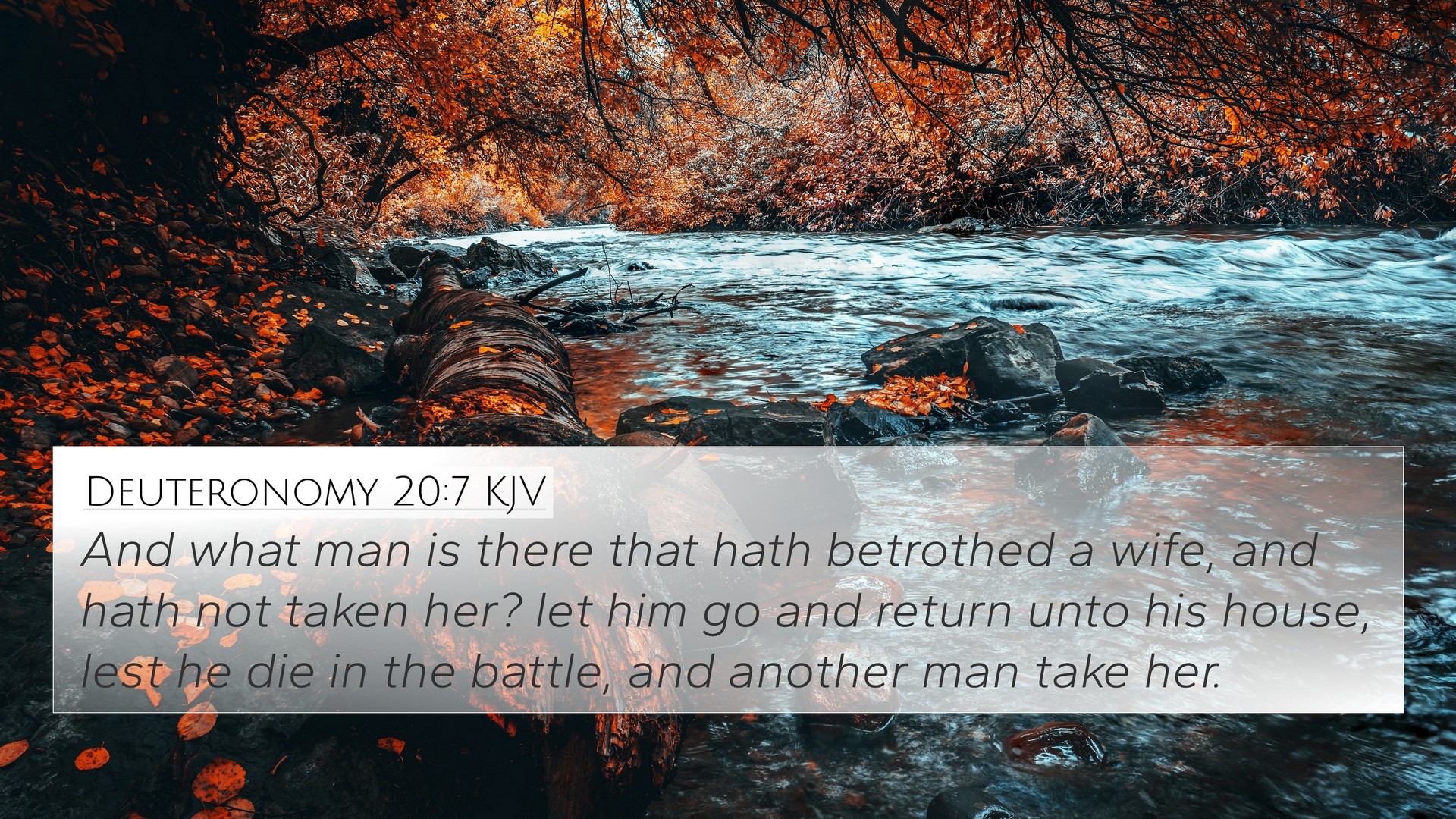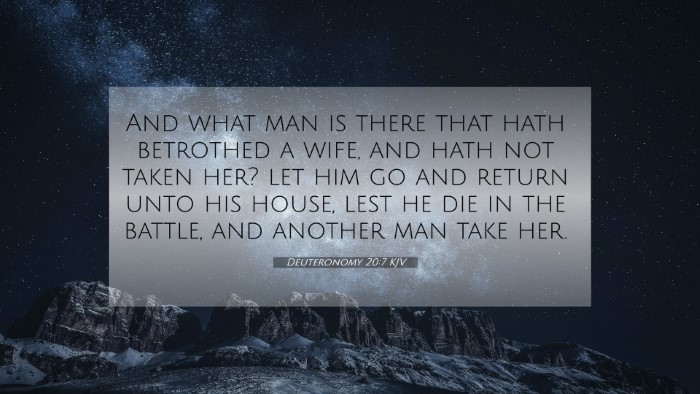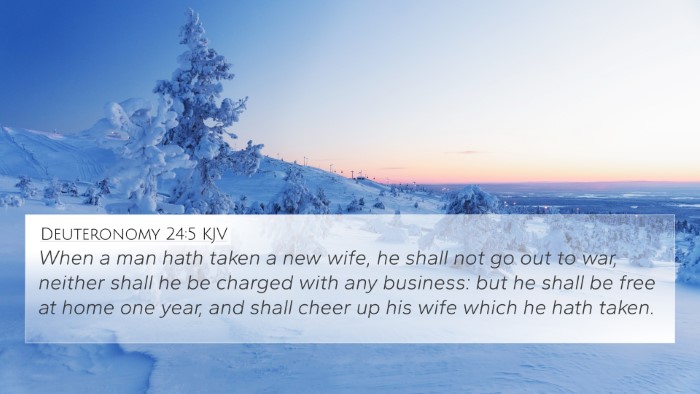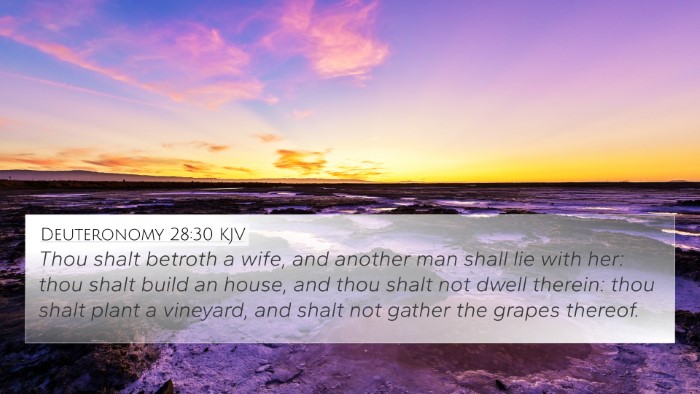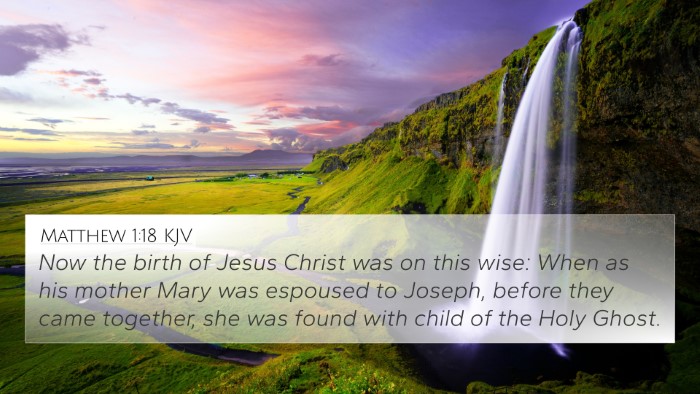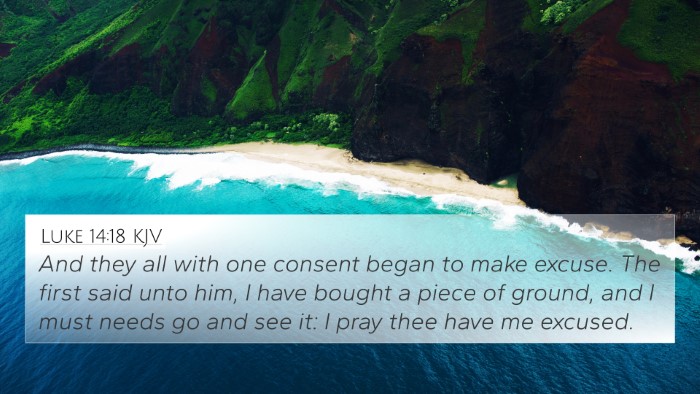Understanding Deuteronomy 20:7
Deuteronomy 20:7 states: "And what man is there that hath betrothed a wife, and hath not taken her? Let him go and return unto his house, lest he die in the battle, and another man take her."
Summary of Meaning
This verse addresses the special circumstances regarding soldiers who are about to go into battle. It highlights the importance of personal commitments, specifically in relation to marriage. According to public domain commentaries:
-
Matthew Henry:
Henry indicates that this command serves to safeguard the interests of soldiers. The exemption allows newly married men to prioritize their marital duties over military service, showing the value placed on family and commitments.
-
Albert Barnes:
Barnes explains that the exemption recognizes the emotional and social implications of engagement and marriage. His commentary elaborates on the significant impact that such personal relationships have on a person's ability to fight with full courage and focus.
-
Adam Clarke:
Clarke discusses the necessity of ensuring that soldiers are free from personal distractions. He highlights that the mental readiness for battle is crucial, and family ties could detract from a soldier's resolve in the heat of combat.
Key Themes and Exemptions
The overarching theme of this verse is the balance between duty and personal obligations. The exemptions serve multiple purposes:
- They affirm the family unit's importance in society.
- They enhance the morale and psychological preparedness of soldiers.
- They honor the sanctity of marriage and compassionate considerations during times of conflict.
Cross-References to Deuteronomy 20:7
Here are several notable Bible verses that are closely related to Deuteronomy 20:7, showcasing the connections between biblical texts:
- Exodus 22:16-17: Discusses the rights of a man who entices a virgin and the consequences of a broken commitment.
- Deuteronomy 24:5: States that a newly married man should be free from military duty for one year to bring happiness to his wife.
- 1 Corinthians 7:28: Indicates that marriage entails responsibilities that may impact one's service to God, paralleling the idea of maintaining personal commitments.
- Proverbs 18:22: Emphasizes the value of finding a good wife, further illustrating the importance of marital relationships.
- Genesis 2:24: Highlights the principle of leaving one’s parents and cleaving to one’s spouse, establishing the foundational nature of marriage.
- Matthew 19:5: Relates Jesus' teaching on marriage to the movement of leaving one's family for the sake of a spouse, echoing the commitment concept in battle.
- Luke 14:20: Similar to Deuteronomy 20:7, where a man excuses himself from a feast for having recently married, exemplifying the weight of marital obligations.
Thematic Connections
Interpreting Deuteronomy 20:7 involves understanding the narrative themes of duty, honor, and the paramount importance of relationships:
- Family vs. Duty: The push and pull between familial responsibilities and societal obligations are critical in biblical teachings.
- Compassion in War: Recognizing personal circumstances during tumultuous times reflects a compassionate approach in governance and community.
- Service and Readiness: The verse stresses how personal distractions can influence a person's readiness to serve, applicable in both military and spiritual contexts.
Insights for Bible Study
For those looking into deeper analysis, consider using the following tools and techniques:
- Bible Concordance: Use biblical concordances to locate related scriptures and their thematic ties.
- Bible Cross-Reference Guide: These guides help explore the connections between verses, enhancing understanding of biblical events.
- Cultural Contextual Study: Investigate the cultural background of marriage and military duty in ancient Israel for a more comprehensive understanding.
- Comparative Bible Study Methods: Draw parallels from other passages to gain insights into the overarching biblical messages.
Conclusion
Deuteronomy 20:7 resonates with profound implications about the balance between personal commitments and societal duties. By examining this verse through the lens of various commentaries and considering cross-references, one can appreciate the rich tapestry of relationships and responsibilities portrayed in scripture.
